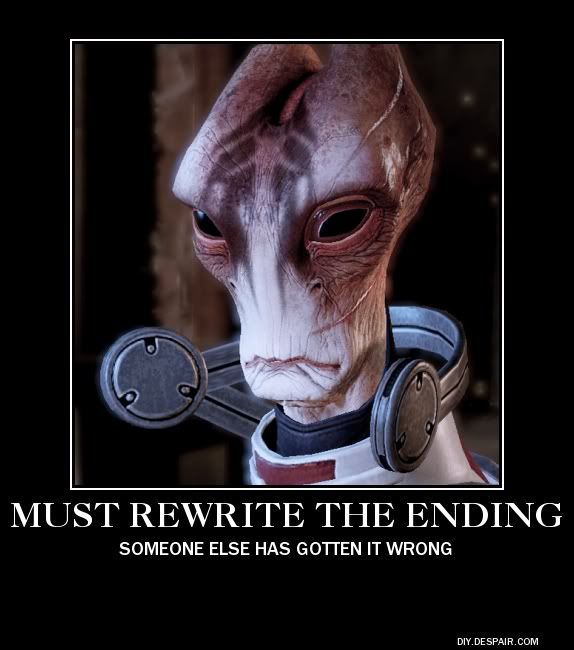No. Just no.Kroxile said:Its just a bunch of people who have a sad that Shepard actually fucking dies at the end of her trilogy.
Sorry not everything is shit rainbows and vomit skittles in magic fairy wonderland, but sometimes shit just doesn't end that way.
That said; they ought to at least put something in to detail the outcome of the player's choices throughout the game. Other than that the endings were good; leave them alone.
The problem with the ME3 endings is not that Shepard dies. The problem is threefold:
1) It makes absolutely no fucking sense. They finally give a reason for the creation of the cycle, and it's self-defeating logic, invalidated by the goals and motivations of the one who says it. In essence, it boils down to "In order to stop organics from making robots that kill them, I made robots that kill them first". If you can't see the glaring flaw in that logic, I'm not sure anything can help you.
2) Your choices up to that point, in a game centered around choices and consequences, are utterly dismissed, or at the very least it feels that way. They could easily solve this problem by having a proper epilogue where they touch on things like the Geth/Quarian future and if the peace (if it happened) holds, what the Krogan do if you cured the Genophage, how the Turians rebuild, what happens with the fleet now that all the Relays are gone, and what happens with your crew.
If they had a proper epilogue, it would be pretty solid in this regard, but as it is, all of your choices ultimately come down to what color space-magic you get in the final cutscene. And that is not acceptable for a series that has always been about choice.
3) The endings as they stand now go directly counter to the themes and tone of the entire series. Mass Effect has always been about the importance of self-determination, defiance of the inevitable and optimism in the face of Armageddon, even throughout the vast majority of ME3. The end of ME3 throws all of that out the window. Shepard suddenly believes that free will goes flying out the window, that synthetics will always inevitably rebel against their creators. It's presented as a fact, and Shepard behaves that way as well, despite the fact that you've spent three games fighting against the inevitability of Reaper victory.
Furthermore, all three options are incredibly pessimistic. There is no "make a better future". That's "Kill everything", "Mind rape everything", and "Forcibly transhumanize everything". None of the optimism that's been so prevalent throughout the series (and the pulp sci-fi it takes so much inspiration from) is even visible in the endings.
2) Your choices up to that point, in a game centered around choices and consequences, are utterly dismissed, or at the very least it feels that way. They could easily solve this problem by having a proper epilogue where they touch on things like the Geth/Quarian future and if the peace (if it happened) holds, what the Krogan do if you cured the Genophage, how the Turians rebuild, what happens with the fleet now that all the Relays are gone, and what happens with your crew.
If they had a proper epilogue, it would be pretty solid in this regard, but as it is, all of your choices ultimately come down to what color space-magic you get in the final cutscene. And that is not acceptable for a series that has always been about choice.
3) The endings as they stand now go directly counter to the themes and tone of the entire series. Mass Effect has always been about the importance of self-determination, defiance of the inevitable and optimism in the face of Armageddon, even throughout the vast majority of ME3. The end of ME3 throws all of that out the window. Shepard suddenly believes that free will goes flying out the window, that synthetics will always inevitably rebel against their creators. It's presented as a fact, and Shepard behaves that way as well, despite the fact that you've spent three games fighting against the inevitability of Reaper victory.
Furthermore, all three options are incredibly pessimistic. There is no "make a better future". That's "Kill everything", "Mind rape everything", and "Forcibly transhumanize everything". None of the optimism that's been so prevalent throughout the series (and the pulp sci-fi it takes so much inspiration from) is even visible in the endings.
I've seen a number of arguments proporting that the endings are in fact good, but none of them have addressed these issues. I'd be okay with that, but all of these points are literary fact, not a matter of opinion. It's not that I like or don't like it, there's very basic literary/narrative flaws with the canon endings. No amount of opinion is going to change that.


